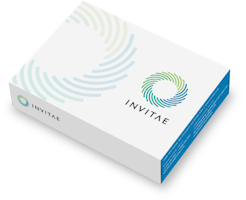
Invitae Tay-Sachs Disease Test
Test code: 04719 •
Test description
The Invitae Tay-Sachs Disease test analyzes HEXA, the gene known to be associated with Tay-Sachs disease (TSD). Tay-Sachs disease is a progressive pediatric neurodegenerative disorder with symptoms ranging from classic TSD (acute infantile) to subacute juvenile and adult-onset forms that progress more slowly. It is caused by the build-up of gangliosides in the brain.
A genetic diagnosis of TSD can identify the specific subtype of the disease, guide medical management, and help predict disease progression and outcome for the patient. It can also facilitate a swift uptake of treatment.
Ordering information
Turnaround time:
10–21 calendar days (14 days on average)New York approved:
YesPreferred specimen:
3mL whole blood in a purple-top EDTA tube (K2EDTA or K3EDTA)Alternate specimens:
Saliva, buccal swab, and gDNA are also accepted.Learn more about specimen requirementsRequest a specimen collection kitClinical description and sensitivity
Clinical description:
Tay-Sachs disease (TSD) is a progressive pediatric neurodegenerative disorder that results from the toxic accumulation of GM2 ganglioside in the central nervous system. TSD is a type of hexosaminidase A deficiency—a condition caused by pathogenic variants in the gene that encodes beta-hexosaminidase A, an enzyme that is essential for breaking down GM2 ganglioside. Infants with TSD typically first present around 3-6 months with symptoms that include progressive muscle weakness, difficulty coordinating muscle movement, decreased attentiveness, and an increased startle response. Symptoms then progress to seizures, blindness, muscle stiffness, and death, usually before age 4.
Acute infantile TSD is the commonest and most severe form of hexosaminidase A deficiency. There are two additional forms, subacute juvenile and adult-onset, which have later ages of onset, more-variable neurologic findings, and less-severe disease progressions. The level of HEXA enzyme activity is inversely correlated with the severity of the disease form.
Assay information
Invitae is a College of American Pathologists (CAP)-accredited and Clinical Laboratory Improvement Amendments (CLIA)-certified clinical diagnostic laboratory performing full-gene sequencing and deletion/duplication analysis using next-generation sequencing technology (NGS).
Our sequence analysis covers clinically important regions of each gene, including coding exons and 10 to 20 base pairs of adjacent intronic sequence on either side of the coding exons in the transcript listed below, depending on the specific gene or test. In addition, the analysis covers select non-coding variants. Any variants that fall outside these regions are not analyzed. Any limitations in the analysis of these genes will be listed on the report. Contact client services with any questions.
Based on validation study results, this assay achieves >99% analytical sensitivity and specificity for single nucleotide variants, insertions and deletions <15bp in length, and exon-level deletions and duplications. Invitae's methods also detect insertions and deletions larger than 15bp but smaller than a full exon but sensitivity for these may be marginally reduced. Invitae’s deletion/duplication analysis determines copy number at a single exon resolution at virtually all targeted exons. However, in rare situations, single-exon copy number events may not be analyzed due to inherent sequence properties or isolated reduction in data quality. Certain types of variants, such as structural rearrangements (e.g. inversions, gene conversion events, translocations, etc.) or variants embedded in sequence with complex architecture (e.g. short tandem repeats or segmental duplications), may not be detected. Additionally, it may not be possible to fully resolve certain details about variants, such as mosaicism, phasing, or mapping ambiguity. Unless explicitly guaranteed, sequence changes in the promoter, non-coding exons, and other non-coding regions are not covered by this assay. Please consult the test definition on our website for details regarding regions or types of variants that are covered or excluded for this test. This report reflects the analysis of an extracted genomic DNA sample. In very rare cases, (circulating hematolymphoid neoplasm, bone marrow transplant, recent blood transfusion) the analyzed DNA may not represent the patient's constitutional genome.
You can customize this test by clicking genes to remove them.
Primary panel
Question about billing?
Find answers